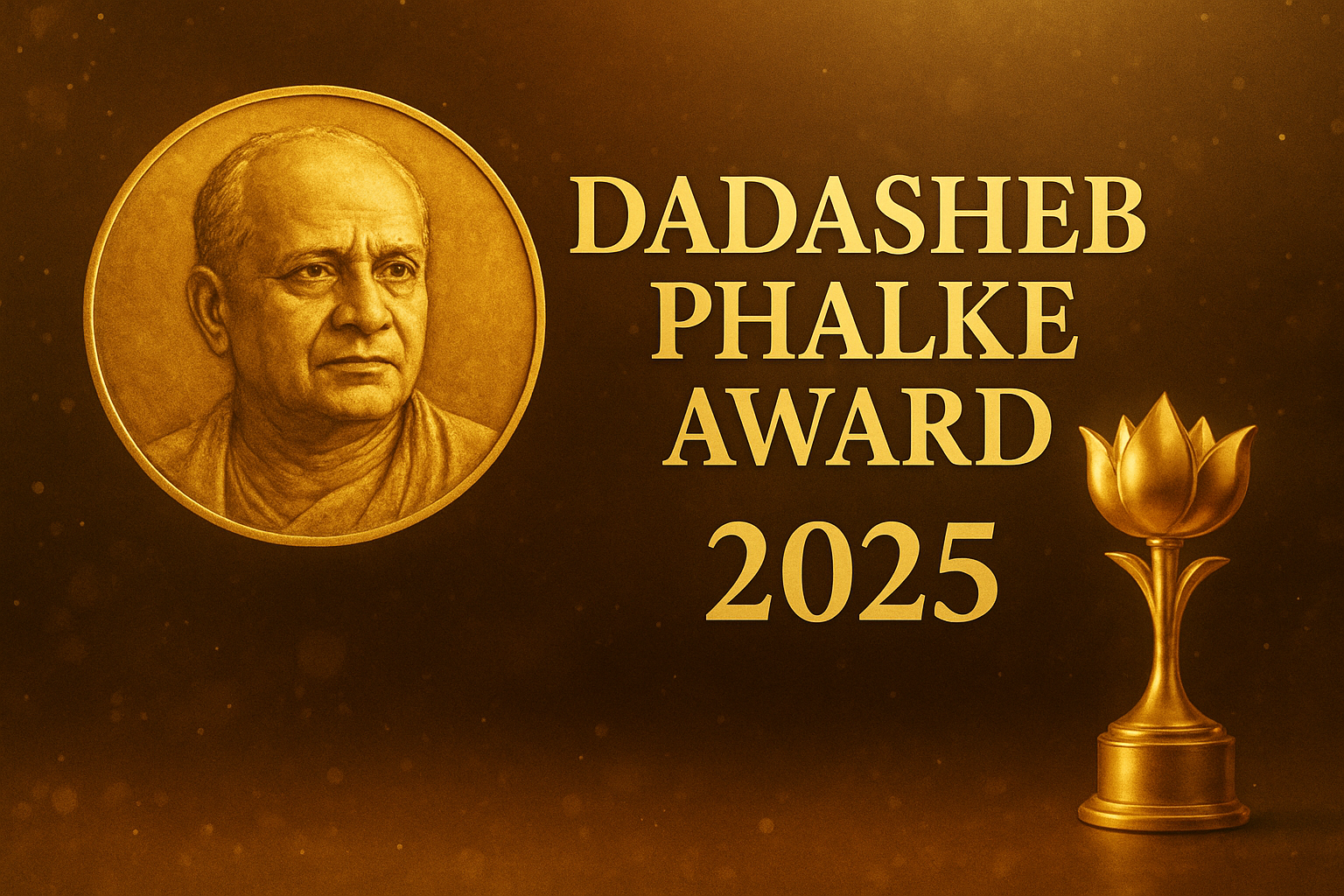Introduction
Thank you for reading this post, don’t forget to subscribe!The Dadasaheb Phalke Award is the highest honour in Indian cinema. Instituted in 1969 by the Government of India, it is named after Dhundiraj Govind Phalke, the legendary filmmaker known as the Father of Indian Cinema, who made India’s first full-length feature film Raja Harishchandra in 1913.
This award is given every year at the National Film Awards to honour an individual’s lifetime contribution to Indian cinema. The recipient receives the Swarna Kamal (Golden Lotus) medallion, a shawl, and a cash prize.
Quick summary
- The Dadasaheb Phalke Award is India’s highest official honour in cinema — a lifetime achievement award instituted by the Government of India in 1969 to commemorate Dhundiraj Govind Phalke (Dadasaheb Phalke), the “father of Indian cinema.”
- As of September 21, 2025, the most recently announced recipient is Mohanlal (for 2023); the award is presented at the National Film Awards ceremony. (News reports and the Directorate of Film Festivals confirm the 2023 selection announced in 2025.)
- Below you’ll find origin & background, importance, how selection works, notable winners & a full year-wise table of recipients (year — recipient — primary film industry). The year-wise table is based on official/compiled records.
Importance of the Award
- Recognises lifetime achievement in Indian cinema.
- Open to all film industries — Hindi, Bengali, Tamil, Telugu, Malayalam, Marathi and more.
- Celebrates not just actors but also directors, producers, musicians, singers, writers, and technicians.
- Considered the most prestigious award for anyone connected with films in India.
Latest Update (2025)
The latest recipient of the Dadasaheb Phalke Award is Mohanlal, superstar of Malayalam cinema, announced as the winner for the year 2023. The award will be formally presented at the upcoming National Film Awards ceremony in 2025.
Year-wise List of Recipients (1969 – 2023)
| Year | Recipient | Industry / Contribution |
| 1969 | Devika Rani | Hindi Cinema |
| 1970 | Birendranath Sircar | Bengali Cinema |
| 1971 | Prithviraj Kapoor | Hindi Cinema |
| 1972 | Pankaj Mullick | Music (Hindi/Bengali) |
| 1973 | Ruby Myers (Sulochana) | Hindi Cinema |
| 1974 | B. N. Reddy | Telugu Cinema |
| 1975 | Dhirendra Nath Ganguly | Bengali Cinema |
| 1976 | Kanan Devi | Bengali Cinema |
| 1977 | Nitin Bose | Bengali / Hindi |
| 1978 | Raichand Boral | Music |
| 1979 | Sohrab Modi | Hindi Cinema |
| 1980 | Paidi Jairaj | Hindi Cinema |
| 1981 | Naushad | Music (Hindi) |
| 1982 | L. V. Prasad | Telugu / Tamil / Hindi |
| 1983 | Durga Khote | Hindi / Marathi |
| 1984 | Satyajit Ray | Bengali (Director) |
| 1985 | V. Shantaram | Hindi / Marathi |
| 1987 | Raj Kapoor | Hindi |
| 1989 | Lata Mangeshkar | Playback Singing |
| 1990 | Akkineni Nageswara Rao | Telugu Cinema |
| 1992 | Bhupen Hazarika | Assamese Cinema / Music |
| 1998 | B. R. Chopra | Hindi (Director/Producer) |
| 2000 | Asha Bhosle | Playback Singing |
| 2001 | Yash Chopra | Hindi (Director) |
| 2005 | Adoor Gopalakrishnan | Malayalam (Director) |
| 2009 | D. Ramanaidu | Telugu (Producer) |
| 2010 | Soumitra Chatterjee | Bengali (Actor) |
| 2013 | Gulzar | Lyricist / Director |
| 2014 | Shashi Kapoor | Hindi (Actor) |
| 2018 | Amitabh Bachchan | Hindi (Actor) |
| 2019 | Rajinikanth | Tamil (Actor) |
| 2020 | Asha Parekh | Hindi (Actress) |
| 2021 | Waheeda Rehman | Hindi (Actress) |
| 2023 | Mohanlal | Malayalam (Actor) |
(This is a simplified list highlighting important recipients; official full list available on the Directorate of Film Festivals website.)
Key Highlights & Trivia
- Both Kapoor family (Prithviraj Kapoor, Raj Kapoor, Shashi Kapoor) and Mangeshkar sisters (Lata Mangeshkar, Asha Bhosle) have received this award.
- It equally honours regional cinema stalwarts like Satyajit Ray, Adoor Gopalakrishnan, Akkineni Nageswara Rao, and Mohanlal.
- Women achievers like Devika Rani, Kanan Devi, Asha Parekh, Waheeda Rehman, and Lata Mangeshkar have also been celebrated.
Conclusion
The Dadasaheb Phalke Award stands as a shining tribute to the people who shaped Indian cinema across generations. From pioneers of the silent era to present-day icons, this award not only preserves the legacy of cinema but also inspires future generations of filmmakers and artists.
As of 2025, 55+ great personalities have been honoured with this award, making it one of the most respected recognitions in the global film industry.
Tip for Students, Researchers & Bloggers: Always check the Directorate of Film Festivals (DFF) official page for the latest updates, as the award year and presentation year sometimes differ.

Leave a Reply